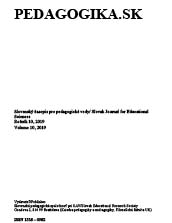Didaktické reflektívne komunity: paradigma vzájomnej pomoci vs. paradigma posudzujúceho hodnotenia v rozvoji kvality vzdelávania
Instructional rounds: paradigm of sharing and helping vs. the paradigm of judging in the instructional practice improvement
Author(s): Martin BrestovanskýSubject(s): School education, State/Government and Education
Published by: Slovenská pedagogická spoločnosť pri SAV
Keywords: instructional rounds; teachers´ professional development; school development; evaluation; participatory paradigm;
Summary/Abstract: The aim of the article is to introduce a specific approach in the reflection and improvement of teaching. The instructional rounds (Elmore et al., 2009) aims at creating a community of key actors associated in a network of cooperating schools, their founders, superintendents, parents, facilitators from academics, and other professionals. Rounds, in a precisely structured way, defines practical problems, creates descriptive data from practice observation, analyses them and formulates the action theories for the visited school. The cooperation is based on the principle of help and mutual learning. It´s focused on development of the entire team (schools and system) and draws particulars from observing pupils' behaviour and understanding of the tasks they are involved in. The approach allows to remove the usual barriers between the evaluator and the observed teacher. All actors are engaged in the learning process, so that the systematic improvement of the school management is possible. The rounds approach originates from participatory paradigm whose admission is conditioned by strengthening both the autonomy of schools and the role of individual actors in schools.
Journal: PEDAGOGIKA.SK
- Issue Year: 2019
- Issue No: 1
- Page Range: 27-46
- Page Count: 20
- Language: Slovak

